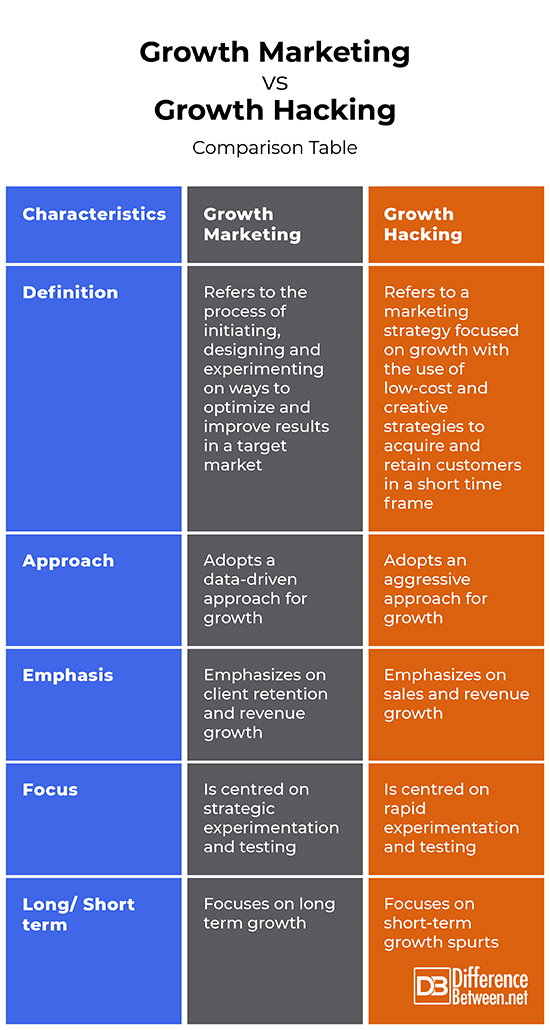Difference Between Growth Marketing and Growth Hacking
As businesses continue to evolve, new survival, marketing and sales strategies have been developed over time. Although this is a never-ending process, different concepts and ideologies may be effective for some businesses and fail for others. This is as a result of the differences in products, businesses structure, environment and policies. While the terms growth marketing and growth hacking are common in the business world, they are synonymously used. While both are powerful tools, they represent different ideologies and methodologies, as discussed in the article below.

What is Growth Marketing?
This is the process of initiating, designing and experimenting on ways to optimize and improve results in a target market. By use of the scientific method, this method focuses less on the creative aspects and more on the data aspects. While the experiments may often fail, growth marketers need to have the next options lined up in case this happens and should be comfortable with failure.
Growth marketers are responsible for:
- Pinpointing areas that need testing and improvement
- Designing and developing experiments
- Conducting set experiments
- Analyzing results generated
- Conducting further experiments if need be
Growth marketing is applied in every stage of the marketing funnel including:
- Awareness- This is the stage whereby a brand educates prospects on its products and services by use of different channels such as social media. Various tests can be carried out at this stage, such as determining which posts drive more traffic or engagement to a post.
- Acquisition- This is a leads generating process which aims at acquiring new prospects. A growth marketer experiments on ways to increase leads through tactics such as changing the page orientation or outlook.
- Activation- This is the process of getting people to use a product or services as soon as possible after purchase.
- Revenue- Activities including product purchases, service upgrades and contracts signing increases a company’s revenue. To maintain and upscale this, growth marketers may experiment on pricing strategies and other upselling strategies.
- Retention- To retain a customer, growth marketers may experiment on personalized support or offer discounts for repeat purchases.
- Referral- This involves the creation of referral programs such as incentives to a customer once he refers someone else to purchase the product or service.
Successful growth marketers are data-driven, creative, product-focused and risk-takers.
While growth marketing can range from a simple task as changing button colour, it can also be complex. Care should, however, be taken as experiments can have different impacts on the business.

What is Growth Hacking?
This is a marketing strategy focused on growth with the use of low-cost and creative strategies to acquire and retain customers in a short time frame. A growth hacker hence focuses on low cost smarter alternatives such as viral marketing, social media and targeted advertising as opposed to the use of advertisements through traditional channels.
Growth hacking is common among startups or new product and service launches in companies. It entails the use of different marketing and product strategies such as persuasive copies, viral strategies and SEO, to increase the conversion rates and achieve rapid growth of the product or service sales. Among techniques used in this include content marketing, search engine optimization, website analytics and A/B testing.
Companies including Dropbox have successfully used growth hacking by rewarding existing users with additional storage for inviting new ones.
Similarities between Growth Marketing and Growth Hacking
- Both aim at driving revenue growth to a business
Differences between Growth Marketing and Growth Hacking
Definition
Growth marketing refers to the process of initiating, designing and experimenting on ways to optimize and improve results in a target market. On the other hand, growth hacking refers to a marketing strategy focused on growth with the use of low-cost and creative strategies to acquire and retain customers.
Approach
While growth marketing adopts a data-driven approach for growth, growth hacking adopts an aggressive approach for growth.
Emphasis
Growth marketing emphasizes on client retention and revenue growth. On the other hand, growth hacking emphasizes on sales and revenue growth.
Focus
Growth marketing is centred on strategic experimentation and testing. On the other hand, growth hacking is centred on rapid experimentation and testing.
Long/ Short term
While growth marketing focuses on long term growth, growth hacking focuses on short-term growth spurts.
Growth Marketing vs. Growth Hacking: Comparison Table

Summary of Growth Marketing vs. Growth Hacking
Growth marketing refers to the process of initiating, designing and experimenting on ways to optimize and improve results in a target market. It is a data-driven process that emphasizes on client retention and revenue growth. It is also centred on strategic experimentation and testing with a focus on long term growth.
On the other hand, growth hacking refers to a marketing strategy focused on growth with the use of low-cost and creative strategies to acquire and retain customers in a short time frame. The process adopts an aggressive approach for growth which Emphasizes on sales and revenue growth. It also focuses on short-term growth-spurts. Although both are effective in different products and services marketing approaches, growth hacking is ideal for established brands while growth hacking is ideal for startups.
- Difference Between Profit Center and Investment Center - July 2, 2022
- Difference Between Anti-Trust and Anti-Competition - June 6, 2022
- Difference Between Stocktaking and Stock Control - June 6, 2022
Search DifferenceBetween.net :
Leave a Response
References :
[0]Amdan Naturinda. Mark It Digital: Complete Guide to Digital Growth Hacking. Amdan Naturinda, 2019. https://books.google.co.ke/books?id=Q8WbDwAAQBAJ&printsec=frontcover&dq=Growth+Marketing&hl=en&sa=X&ved=0ahUKEwin9aWO5p_pAhWFwqYKHSByC6Q4FBDoAQhDMAQ#v=onepage&q=Growth%20Marketing&f=false
[1]Emmanuel Fauvel. 101 Tips About Growth Hacking: Winning Tactics, Winning Strategies, Growth Hacking Examples, Small & Big Brands Hacks. MyPublishingCompany, 2017. https://books.google.co.ke/books?id=UT01DwAAQBAJ&printsec=frontcover&dq=Difference+between+Growth+Marketing+and+Growth+Hacking&hl=en&sa=X&ved=0ahUKEwjr77fh5Z_pAhW9xcQBHbIDDgs4ChDoAQhTMAY#v=onepage&q=Difference%20between%20Growth%20Marketing%20and%20Growth%20Hacking&f=false
[2]Deepak Sharma. Growth Hacking Your First Startup: A Simple Guide to Marketing for Entrepreneurs. Notion Press Publishers, 2019. https://books.google.co.ke/books?id=EVetDwAAQBAJ&printsec=frontcover&dq=Difference+between+Growth+Marketing+and+Growth+Hacking&hl=en&sa=X&ved=0ahUKEwiym4DV5Z_pAhUrxMQBHTOpBiIQ6AEIXDAH#v=onepage&q=Difference%20between%20Growth%20Marketing%20and%20Growth%20Hacking&f=false
[3]Image credit: https://pixabay.com/de/illustrations/pfeile-growth-hacking-marketing-1969944/
[4]Image credit: https://cdn.pixabay.com/photo/2016/03/01/07/44/arrows-1229855_960_720.jpg
